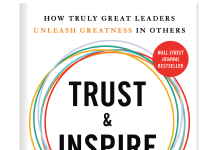At the end of the day, we all have a story to tell. No matter what your walk of life, you have done something or seen something that is worthy of a story—worthy of a lesson to someone else.
I have spent my entire professional career talking to people about how storytelling makes a difference in their lives. Whether you are the CEO of a company or a parent trying to relate a message to your kid, using a story to prove a point is such a powerful tool. In business, making your ideas, products, and brands more valuable to a consumer is the name of the game. After all, if they think what you have to offer isn’t of any value, why would they invest any time or money into it? We compose ourselves and our ideas into stories, making sense of concepts and hoping that someone will like (and buy) what we have to say. Stories add intrinsic value—and telling these stories in a compelling manner can be the final selling point for you and your product.
Last Christmas, my 7-year-old daughter asked for an American Girl Doll. Of course, being a clueless father, I thought, “Great, a doll is an inexpensive gift!” What I didn’t know was the value behind an American Girl Doll. These dolls run upward of $100 with plenty of expensive accessories to buy, as well. But what makes this American Girl Doll more valuable than any other doll? It’s their story. Sure, the dolls are high quality—but so are other dolls with nearly half the price tag. What sets an American Girl Doll apart is each doll’s individual story. They aren’t just a doll from the store—they have a name, a story, and a book to tell their story. In my daughter’s case, we didn’t buy a doll; we bought Julie. Julie is a free-spirited, blonde hippie who loves to travel and explore. She has a pet bunny and a best friend named Ivy (another American Girl Doll). We know more about Julie, and she’s, therefore, more valuable to us.
Just like American Girl Dolls, storytelling in business adds value. Having a compelling story makes you, your products, your ideas, your training, and your brand stand out. And when you stand out from the rest—you are more valuable. If that sounds like a simple formula, it’s because it is. There are three distinct ways a story adds value to you and your business: It makes you relatable, emotional, and multidimensional. If you can capture all three, you will find that people will want to buy into YOU because they are so moved by the story you are telling.
Relatable: Being able to tell a story instantly connects you with the customer, whether it’s a real customer, your kid, your learners—whoever is on the other side of your story needs to connect with you. Ever wonder why we love musicians so much? The story in their song is so powerful that it moves your emotions. They sing to you, or about an experience you can relate to. Garth Brooks sang a song called “Unanswered Prayers”—I think we can all relate to that message. And when you relate to someone, you feel that connection. People want to feel as though they connect with and understand the people and brands they do business with. The right story is that relatable connection.
Emotional: Logic may make you think, but emotions make you act. When you are able to engage the emotion of a listener, you can cause them to take action. If you want them to buy your product, adopt your ideas, or even hire you, appeal to their emotions. When was the last time you went to a movie? Every good movie has that moment or character that pulls at your emotional heartstrings. It can be a classic such as Shawshank Redemption or a sports movie such as Rudy. You move someone emotionally and you have them hooked.
Multidimensional: Without a story, you and your product just blend in with others. Compelling stories add context, history, and relevancy to you and your products. They can make even the most mediocre things stand out and be seen in a different light. Stories add vibrancy and depth. There’s an exact science to a brand, and all good brands tell a story—whether directly or indirectly. Nike is a great example of this. Remember the “Be Like Mike” campaigns. In no universe could any of us play basketball like Michael Jordan just by wearing his shoes—but those commercials made you think, made you act, and for just a moment when you put those shoes on, the story of this kid who was cut from his high school basketball team resonated with millions of people across America—and billions of dollars have been spent on the shoes because of the story.
A story adds value by relating listeners and consumers to you and your product, appealing to the emotions of audiences to cause action, and intensifying aspects of you and your product that may go unnoticed. The value added by storytelling gives significance that cannot be found anywhere else. A business that is valued by its consumers will be a more successful business; and a “you” that is more valued by others will be a more successful you.
Stories are an influencer’s best friend. People love stories, and they can inspire and motivate others when used effectively. Not only do stories serve the basic needs of communication, but they also add value to almost anything: yourself, your product, your brand, your training, your business. People typically want to know more about you before investing time in a relationship. Likewise, consumers like to hear the story of a product before they buy it.
So the next time you go to a sales meeting or have a heart-to-heart with your son or daughter, tell them a story that will make them stop in their tracks—because once you have them hooked, then you have the sell.
Ty Bennett is the author of “The Power of Storytelling: The Art of Influential Communication,” a keynote speaker, and a speech coach. For more information, visit www.leadershipinc.com




